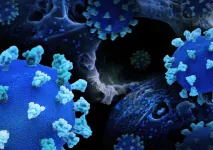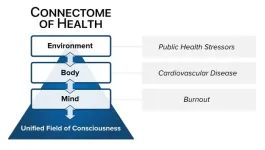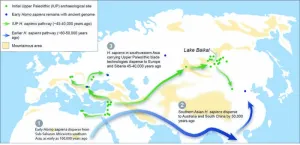(Press-News.org) A clinical trial has launched to test whether early intensive immune modulation for hospitalized COVID-19 patients with relatively mild illness is beneficial. The placebo-controlled study, part of the global clinical trials consortium known as Strategies and Treatments for Respiratory Infections and Viral Emergencies (STRIVE), will enroll approximately 1,500 people at research sites around the world. It is supported by the National Institutes of Health’s National Institute of Allergy and Infectious Diseases (NIAID) in partnership with NIH’s National Center for Advancing Translational Sciences (NCATS).
Immune modulators—treatments for modifying the immune system to better respond to disease or illness—are lifesaving for certain hospitalized COVID-19 patients. However, the optimal timing for administering the medicines to achieve the best outcomes has not been defined.
“The evidence is clear that immune modulation can be beneficial for severely ill COVID-19 patients,” said NIAID Acting Director Hugh Auchincloss, M.D. “Patients with milder cases of COVID-19 are often administered one immune modulator, and a second treatment is added only if the patient becomes severely ill. It is possible that adding a second therapeutic earlier in the patient’s treatment could prevent progression to severe illness and improve recovery. This clinical study aims to answer that question.”
The drug being used to test the strategy of early intensification of immune modulation, abatacept (or Orencia), is manufactured by Bristol Myers Squibb, Princeton, New Jersey. It was first approved by the U.S. Food and Drug Administration in 2005 as a treatment for rheumatoid arthritis in adults and subsequently has been approved to treat other forms of arthritis in adults and children. Researchers think it may also be useful as an immune modulator for COVID-19 by tamping down over-active immune responses.
Abatacept works by binding to and blocking molecules that normally activate T cells, a key part of the immune system. Other immune cells may also be affected by the drug. For patients taking abatacept, the immune system may be less likely to “overreact” when fighting an infection such as COVID-19. Symptoms from an unregulated immune response to COVID-19 can include severe respiratory distress, which can be fatal.
Participants may enroll in the current trial if they are receiving supplemental low-flow oxygen upon being hospitalized for COVID-19 infection at one of the participating study sites. In addition to the local standard of care (which varies by site but must include an immune modulator drug), participants will be randomized to immediately receive either a single intravenous infusion of abatacept with dosage dependent on the patient’s weight, or a placebo infusion. Neither the investigators nor the participants will know who is receiving early immunomodulator intensification and who is not.
Throughout the trial, patient safety will be monitored. Study investigators will closely track participants’ progress over the course of 60 days and will note when they are well enough to be discharged from the hospital and return home. These data, together with the patients’ status at 60 days, will help the study team to understand whether patients benefit from early immune modulator intensification.
Through the STRIVE platform, multiple therapeutic interventions for respiratory infections may be tested at once across a global network of study sites. More than 270 international sites plan to participate in this program, which enables continuous enrollment as COVID-19 surges in different parts of the world. The platform is designed to rapidly test new interventions to combat outbreaks of any respiratory disease, including pathogen X. STRIVE began its first trial, a test of the antiviral S-217622, in February 2023.
For more information about the trial, please visit ClinicalTrials.gov and search identifier NCT05822583.
STRIVE emerged from the NIH ACTIV public-private-partnership initiated in April 2020. The purpose of ACTIV was to develop a coordinated research strategy for prioritizing and speeding development of the most promising treatments and vaccines for COVID-19. STRIVE builds on the efforts of prior ACTIV master protocols that evaluated various therapeutics for people hospitalized with COVID-19. STRIVE is composed of global clinical trial experts from several medical specialties including infectious diseases, pulmonology, intensive care, and emergency medicine. Trial leadership includes Protocol co-chairs Christina Barkauskas, M.D., Duke University, Durham, N.C.; Jane O’Halloran, M.D., Ph.D., Washington University in St. Louis; Nnakelu Eriobu, M.D., Institute of Human Virology in Nigeria; and Tom Murray, Ph.D., from the University of Minnesota in Minneapolis.
NIAID conducts and supports research—at NIH, throughout the United States, and worldwide—to study the causes of infectious and immune-mediated diseases, and to develop better means of preventing, diagnosing and treating these illnesses. News releases, fact sheets and other NIAID-related materials are available on the NIAID website.
About the National Institutes of Health (NIH): NIH, the nation's medical research agency, includes 27 Institutes and Centers and is a component of the U.S. Department of Health and Human Services. NIH is the primary federal agency conducting and supporting basic, clinical, and translational medical research, and is investigating the causes, treatments, and cures for both common and rare diseases. For more information about NIH and its programs, visit www.nih.gov.
NIH...Turning Discovery Into Health®
END
PHILADELPHIA – A study in the Proceedings of the National Academy of Sciences (PNAS) identifies five factors that Annenberg Public Policy Center (APPC) researchers say reflect public assessments of science and are associated with public support for increasing funding of science and support for federal funding of basic research. These factors are whether science and scientists are perceived to be credible and prudent, and whether their work is perceived to be untainted by bias, self-correcting, and beneficial.
Drawing on 13 questions in APPC’s 2022 nationally representative ...
A new editorial published in the Heart and Mind journal proposes an innovative systems medicine approach to address the epidemic of clinician burnout and holistically improve clinician mental health and wellbeing (Heart and Mind: September 18, 2023. | DOI: 10.4103/hm.HM-D-23-00013, published ahead of print).
In the US and globally, clinician burnout has reached epidemic levels, with over 50% of physicians and healthcare providers reporting symptoms. Besides impairing quality of life, burnout increases risk of mental health disorders, cardiovascular disease and impaired ...
LAWRENCE — It’s an Ice Age mystery that’s been debated for decades among anthropologists: Exactly when and how did the flow of Homo sapiens in Eurasia happen? Did a cold snap or a warming spell drive early human movement from Africa into Europe and Asia?
A new study appearing in Science Advances compares Pleistocene vegetation communities around Lake Baikal in Siberia, Russia, to the oldest archeological traces of Homo sapiens in the region. The researchers use the “remarkable evidence” to tell a compelling story from 45,000-50,000 years ago with new detail: how the first humans migrated across ...
Most healthcare facilities in many Low- and Middle-income Countries (LMICs) are unprepared to treat patients with cardiovascular diseases – despite these conditions leading to millions of people dying prematurely every year, a new study reveals.
Experts analysed health survey data from eight LMICs across four World Health Organisation world regions to discover that most facilities are unprepared to deliver services to treat or manage cardiovascular disease risk factors (CVDRF) such as diabetes and hypertension.
However, the increased ...
Africa is the birthplace of modern humans and the continent with the highest level of genetic diversity. While ancient DNA studies are revealing some aspects of the genetic structure of Africa before the spread of food production, issues concerning DNA preservation have limited the insights from ancient DNA. Hoping to find clues in modern populations, researchers from a Portuguese-Angolan TwinLab ventured into the Angolan Namib desert – a remote, multi-ethnic region where different traditions met. “We were able to locate groups which were thought to have disappeared more than 50 years ago”, states Jorge ...
UC San Diego Health has been recognized as a top performer in the 2023 Bernard A. Birnbaum, MD, Quality Leadership Ranking by Vizient, Inc. for its excellence in delivering high-quality patient care. This achievement represents the fifth consecutive year that UC San Diego Health has been ranked among the top ten academic health systems in the United States.
“This incredible accomplishment is a direct result of the exceptional care provided each day by our multidisciplinary teams throughout our health system,” said Patty Maysent, CEO of UC San Diego Health. “We are extremely proud to have achieved this national honor now for five years in a row, which ...
Louisiana Cancer Research Center (LCRC) Associate Director of Administration Sven Davisson has been appointed to the board of the Association of Independent Research Institutes (AIRI).
During his two-year term, Davisson will serve as the organization’s treasurer. He has served the organization in various roles since 2012.
AIRI is a national association of independent, not-for-profit biomedical and behavioral research institutes whose mission is to enhance the ability of its members to improve human health and advance knowledge through networking, education, and involvement in the development of science ...
Researchers from the Johns Hopkins Malaria Research Institute at the Johns Hopkins Bloomberg School of Public Health have made an important finding about Aedes aegypti mosquitoes—one that could one day lead to better methods for reducing the mosquito-to-human transmission of dengue, yellow fever, Zika, and other harmful and sometimes deadly viruses.
Ae. aegypti mosquitoes do not succumb to these viruses when infected and continue to move and feed normally. As such, the ...
A new study, modeling the potential of solar-powered vehicles in the urban context in 100 cities across the world, shows that solar energy provides a range between 11 and 29 km per day, reducing charging needs by half.
Despite the rapid adoption of electric vehicles, the transport sector is still responsible for around a third of global carbon dioxide (CO2) emissions worldwide. Therefore, to achieve decarbonization targets, it is required to significantly decrease the emissions associated with mobility.
Integrating photovoltaic modules into ...
Like many collectors of L.P. records, James Fitzgerald’s brother-in-law has a favorite store where he consistently finds the best vinyl for his collection. But there are times when he spends hours at the store and comes up empty. He also knows that occasionally he should venture to the record store on the other side of town, where he sometimes scores a hard-to-find gem that was stocked since his last visit.
Fitzgerald’s brother-in-law is making a calculation: weighing probable outcomes to guide his behavior. His favorite record store ...







